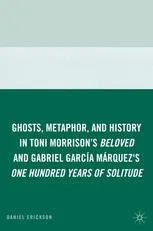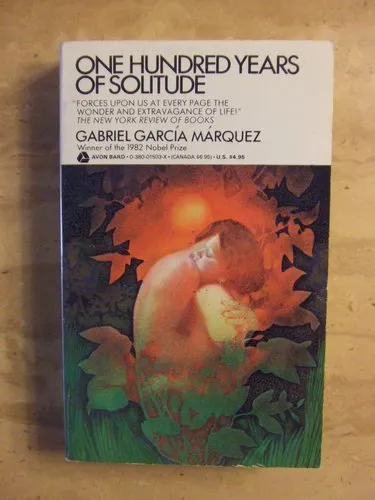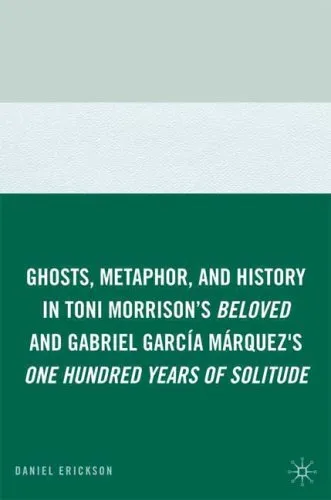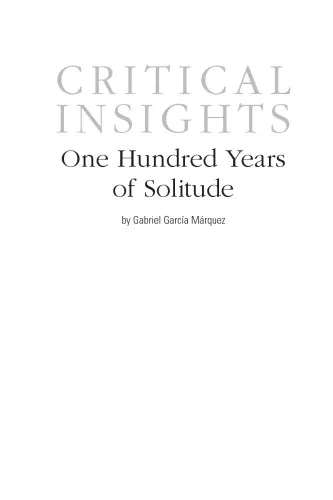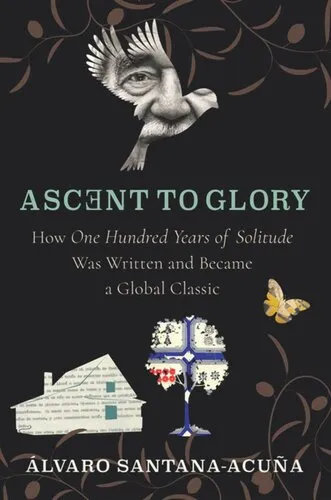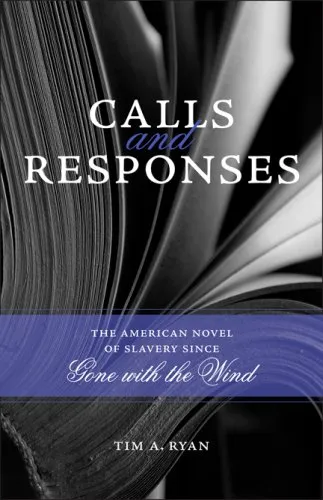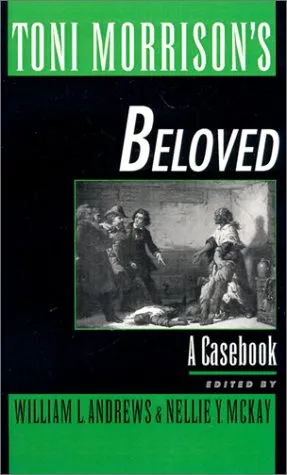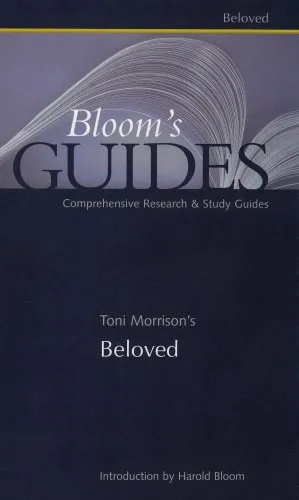Ghosts, Metaphor, and History in Toni Morrison’s Beloved and Gabriel García Márquez’s One Hundred Years of Solitude
3.8
بر اساس نظر کاربران

شما میتونید سوالاتتون در باره کتاب رو از هوش مصنوعیش بعد از ورود بپرسید
هر دانلود یا پرسش از هوش مصنوعی 2 امتیاز لازم دارد، برای بدست آوردن امتیاز رایگان، به صفحه ی راهنمای امتیازات سر بزنید و یک سری کار ارزشمند انجام بدینکتاب های مرتبط:
Persian Summary
مقدمهای بر کتاب
کتاب "Ghosts, Metaphor, and History in Toni Morrison’s Beloved and Gabriel García Márquez’s One Hundred Years of Solitude" اثر دنیل اریکسون به بررسی عمیق ارتباطات بین ارواح، استعاره و تاریخ در دو اثر برجسته ادبیات جهان میپردازد. این کتاب تحلیل جامع و بینرشتهای از این دو رمان ارائه میدهد و با استفاده از روشهای نقد ادبی و روانشناختی، خواننده را به دنیای پیچیدهای از معناها و مفاهیم میبرد که درون این آثار پنهان است.
خلاصهای جامع از کتاب
در این کتاب دنیل اریکسون به مطالعه تطبیقی دو اثر بزرگ و تأثیرگذار یعنی "Beloved" اثر تونی موریسون و "One Hundred Years of Solitude" نوشته گابریل گارسیا مارکز میپردازد. نویسنده نشان میدهد که چگونه موریسون و مارکز از ارواح به عنوان ابزاری قدرتمند برای بیان تجربیات تاریخی و فرهنگی استفاده میکنند. ارواح در این آثار نه تنها عنصر وحشت و راز را اضافه میکنند بلکه به عنوان نمایانگران خاطرات جمعی و زخمهای تاریخی عمل میکنند. اریکسون با تحلیل دقیق استعارههای به کار رفته در هر دو اثر، پیوندی قدرتمند میان ادبیات، تاریخ و روانشناسی فرهنگی برقرار میکند.
نکات کلیدی
- استفاده از ادبیات به عنوان ابزاری برای بازنمایی تاریخ و خاطرات جمعی
- نقش بیبدیل استعاره در تقویت درک خواننده از مفاهیم پیچیده
- تأثیرات متقابل بین فرهنگ، تاریخ و ادبیات در ساختار داستانی
- تحلیل دقیق شخصیتها و موقعیتهای داستانی به عنوان نمایانگر حالتهای روانشناختی و فرهنگی
جملات معروف از کتاب
"ارواح نه تنها درگیر زمانهای گذشتهاند، بلکه حامل داستانهای ناگفتهای هستند که باید شنیده شوند."
"استعاره مرزی را میان واقعیت و خیال ایجاد میکند که خواننده را دعوت به تفکر و تأمل عمیقتر میکند."
چرا این کتاب مهم است
این کتاب به دلیل تحلیلهای جامع و جالب توجهاش از دو شاهکار ادبیات، برای دانشجویان و محققان مطالعات ادبی و فرهنگی بسیار با ارزش است. اریکسون به مهارت خاصی دارد که میتواند مفاهیم پیچیده را به صورتی ساده و قابل درک شرح دهد. این کتاب خوانندگان خود را به تأمل در مورد تاریخ، فرهنگ و قدرت ادبیات در بازتاب و تغییر این عناصر فرا میخواند.
علاوه بر این، نقش ارواح و استعارهها در روایت تاریخی و فرهنگی و چالشهای مرتبط با آنها دوستانداران تحلیلهای بینرشتهای و تحلیلهای مربوط به روانشناسی فرهنگ را هم جذب میکند.
Welcome to a profound exploration of two seminal literary works that have captivated readers and scholars alike. "Ghosts, Metaphor, and History in Toni Morrison’s Beloved and Gabriel García Márquez’s One Hundred Years of Solitude" offers an insightful analysis into how these novels use ghostly presences and metaphoric language to delve into the complexities of history, memory, and identity. This intellectually stimulating book invites readers to venture into the depths of narrative construction and thematic intricacies set forth by two literary giants: Toni Morrison and Gabriel García Márquez.
Detailed Summary of the Book
In "Ghosts, Metaphor, and History," Daniel Erickson intricately weaves a comparative analysis of Morrison's "Beloved" and Márquez's "One Hundred Years of Solitude." The book scrutinizes how each novel employs the supernatural and metaphor as pivotal tools for confronting and representing historical traumas specific to different cultural contexts—the African American experience in Morrison's narrative and Latin American collective memory in Márquez's. Erickson dissects how the spectral and the surreal operate not just as narrative devices but as crucial means for excavating hidden histories and submerged memories.
The book underscores the function of ghosts in both novels as symbolic embodiments of the past that refuse to be silenced. In "Beloved," the ghost of Sethe’s daughter serves as a haunting reminder of slavery's enduring scars, while in "One Hundred Years of Solitude," the apparitions and surreal occurrences reflect the cyclical nature of time and history in the mythical town of Macondo. Erickson eloquently argues that Morrison and Márquez illuminate how personal and collective histories are inextricably linked, using the ethereal to address the unspoken realities of oppression and resistance.
Key Takeaways
- Ghosts serve as pivotal narrative devices that engage with and challenge the historical and social contexts within both novels.
- Through metaphorical language, both Morrison and Márquez delve into themes of memory, identity, and cultural heritage.
- The novels reveal how personal stories and collective histories intertwine and inform one another, shaping contemporary understandings of past traumas.
- Erickson highlights the authors’ shared ability to address complex themes of identity and history while foregrounding marginalized voices and perspectives.
Famous Quotes from the Book
"In both Morrison and Márquez’s narratives, ghosts are not merely indicators of past events, but active agents reminding characters and readers alike that history’s shadows are ever-present." — Daniel Erickson
"Metaphors transform the narrative space into a place where the unspeakable can be spoken, where memory is liberated from the constraints of linear time." — Daniel Erickson
Why This Book Matters
"Ghosts, Metaphor, and History" is an essential contribution to literary criticism and postcolonial studies. Erickson’s work is not only significant for fans and scholars of Morrison and Márquez but also for those interested in how literature serves as a vehicle for exploring complex cultural dynamics and historical discourse.
By examining two masterpieces through the lens of the supernatural and metaphorical, Erickson provides a fresh perspective on how literary art can confront personal and communal pasts. This book stands as a testament to the transformative power of storytelling, urging readers to recognize the spectral narratives that linger in their own histories and communities.
دانلود رایگان مستقیم
شما میتونید سوالاتتون در باره کتاب رو از هوش مصنوعیش بعد از ورود بپرسید
دسترسی به کتابها از طریق پلتفرمهای قانونی و کتابخانههای عمومی نه تنها از حقوق نویسندگان و ناشران حمایت میکند، بلکه به پایداری فرهنگ کتابخوانی نیز کمک میرساند. پیش از دانلود، لحظهای به بررسی این گزینهها فکر کنید.
این کتاب رو در پلتفرم های دیگه ببینید
WorldCat به شما کمک میکنه تا کتاب ها رو در کتابخانه های سراسر دنیا پیدا کنید
امتیازها، نظرات تخصصی و صحبت ها درباره کتاب را در Goodreads ببینید
کتابهای کمیاب یا دست دوم را در AbeBooks پیدا کنید و بخرید
1574
بازدید3.8
امتیاز0
نظر98%
رضایتنظرات:
3.8
بر اساس 0 نظر کاربران
Questions & Answers
Ask questions about this book or help others by answering
No questions yet. Be the first to ask!
